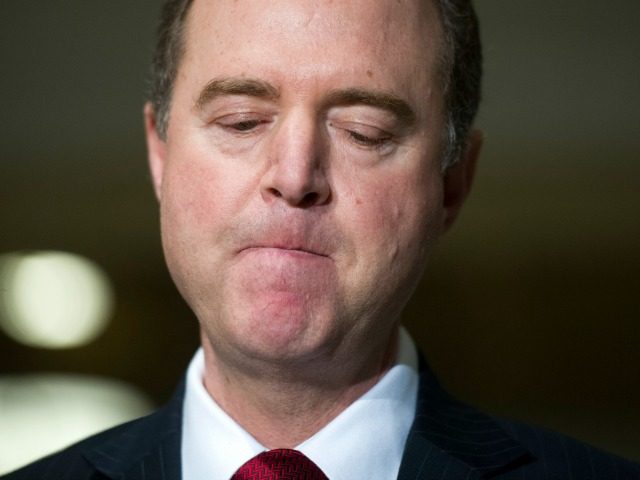The “Russiagate” collusion theory took a huge blow this week, as the House Intelligence Committee’s probe into Russia meddling came to an end.
While the special counsel probe continues, the House Intelligence Committee’s conclusion of “no collusion” underscored the lack of any evidence to date of any such activities.
“The collusion conspiracy theory is breaking down. There is no evidence of collusion at this point after year-plus investigations in the House and Senate. [Rep. Adam Schiff] claimed a year ago he had more than circumstantial evidence of collusion, but he still can’t produce it,” said a source involved in Congress’s Russia investigations.
“And we’ve seen nothing on collusion from [special counsel Robert] Mueller. In addition, everyone now knows the Steele dossier is a fraud, and that the FBI was using it anyway. So the only thing sustaining the collusion narrative now is the media’s complicity in it.”
Democrats on the committee complained they just were not allowed to dig deep enough — after more than a year of investigating and 73 witness interviews. They have vowed to keep investigating, although without the power to compel witnesses or documents, it is hard to imagine they will make much progress.
And they continue to argue that disparate incidents amounted to collusion — a London professor telling Trump volunteer campaign aide George Papadopoulos that the Russians had thousands of emails that were embarrassing to Hillary Clinton and Donald Trump Jr. showing receptivity by accepting a meeting with a Russian lawyer who purportedly had dirt on Clinton.
But the lead Republican on the House Intelligence Committee’s Russia probe, Rep. Mike Conaway (R-TX), dismissed that idea, telling reporters after the committee’s conclusion was announced:
Only Tom Clancy or Vince Flynn or someone else like that could take this series of inadvertent contacts with each other, or meetings, whatever, and weave that into some sort of a fictional page-turner spy thriller. But we’re not dealing with fiction, we’re dealing with facts. And we found no evidence of any collusion, of anything that people were actually doing, other than taking a meeting they shouldn’t have taken or inadvertently being in the same building.
Perhaps the biggest blow to Democrats is the loss of the probe as a political vehicle ahead of the 2018 midterm elections.
The House Intelligence Committee’s top Democrat, Rep. Adam Schiff (D-CA), had become a cable news fixture talking about Russia collusion and suspected leaker to CNN about the probe. The RNC tracked Schiff’s TV interviews in the last 13 months about the probe at 227.
“It’s not shocking that the person most upset by the outcome had used the investigation to launch his TV career,” Republican National Committee spokesman Michael Ahrens told the Washington Examiner.
Schiff also tried to fundraise off of the Russia probe, claiming in one campaign ad that Trump and his “friends at Breitbart” were going after him.
Although the Senate Intelligence and Judiciary Committees continue their investigations, the top Democrats on those committees have been nowhere near as vocal or partisan. And there are no signs that either committee has found any collusion yet. In October, Senate Intelligence Committee chairman Richard Burr (R-NC) told reporters that he had no “initial findings” on collusion, ten months after the investigation began.
Contrary to Trump critics’ fears and accusations, the end of the House probe does not appear to affect the special counsel’s investigation. According to the New York Times, Mueller opened a new avenue of inquiry in recent weeks, requesting all documents related to Russia from the Trump Organization, despite the president’s warning Mueller to stay out of his finances.
But Andrew McCarthy, senior fellow at the National Review and a former prosecutor, said any evidence of collusion found by the special counsel would have likely leaked by now. He also noted that indictments against former National Security adviser Michael Flynn, former Trump campaign manager Paul Manafort, his business associate Rick Gates, and former volunteer campaign adviser George Papadopoulos have not been related to collusion.
“If you look at the charging instruments that Mueller has filed, the indictments and information that’s come out, the guilty pleas that have come out,” he said, “he’s even got guys who clearly have connections with Russia, like Papadopoulos and Flynn and Manafort and Gates, and there’s not a whisper in any of these charges that there was a conspiracy between Trump and Russia.”
The ending of the House Intelligence Committee probe could mean a second special counsel, however, now that House Republican lawmakers have more time to investigate potential misbehavior at the Justice Department and the FBI.
House Intelligence Committee chairman Devin Nunes (R-CA) has said the committee will continue to investigate FISA abuse, the unmasking of Americans’ names in intelligence reports, the origins and use of the Trump dossier, and intelligence community leaks.
Additionally, Rep. Trey Gowdy (R-SC), House Intelligence Committee member and chairman of the House Oversight and Government Reform Committee, recently requested — along with House Judiciary Committee chairman Bob Goodlatte (R-VA) — that Attorney General Jeff Sessions and Deputy Attorney General Rod Rosenstein appoint a second special counsel.
That request has now been echoed by four senators, including the Senate Judiciary Committee chairman, increasing the chances that it will happen, or that a DOJ prosecutor will be assigned to investigate the matter.
A second special counsel could ensure that any investigation into the DOJ and FBI continues, even if Democrats take the House in the 2018 midterm elections, which, historically, they are favored to do, as the opposing party of an incumbent president.
However, the pressure is on House Republicans to do as much as they can before that might happen, McCarthy noted.
“There’s a limited number of legislative days that they have left in an election year,” he said. “If they lose control of the House, the investigation’s over because the Democrats will kill the investigation.”

COMMENTS
Please let us know if you're having issues with commenting.